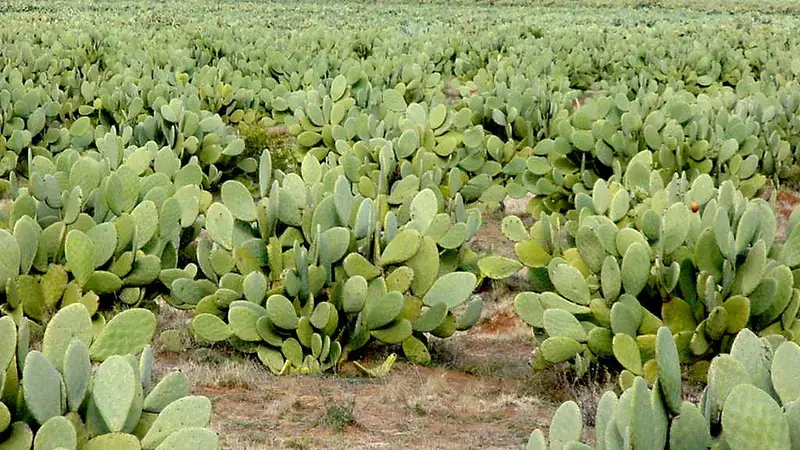Strengthening the resilience of crop-livestock production systems

Building climate-resilient, integrated crop-livestock farming systems with a strong market orientation can be a key driver of productivity, food security, and the sustainable use of natural resources under changing climatic conditions. ICARDA uses plant biomass to restore soil health and feed livestock, and by focusing on the agronomic elements of production systems, we address the increasing water-limited yield gaps observed across many dryland regions.
Our efforts to reverse degradation on over-exploited rangelands combine water harvesting, controlled grazing, effective soil preparation, and the planting of well-adapted native shrubs. Additional measures include community-based breeding programs to increase sheep and goat productivity and the sustainable use of indigenous genetic resources; climate-smart feed production and precision feeding systems; and the safe use of marginal-quality water in feed and forage production.
Managing Tunisia’s rangelands – for rural communities and the environment
ICARDA also works with its national partners to improve the governance and productivity of rangelands through policy and institutional innovations. In Tunisia, for instance, the Center has helped to develop a new ‘Pastoral Code’ that is designed to reverse increasing degradation across rangeland areas – a critical measure in a country that lost an estimated 600,000 hectares of productive rangeland between 2005 and 2012. [1]
In addition to overgrazing, crop encroachment and complex land tenure systems, degradation was also driven by a lack of protective regulations - a consequence of rangelands being inadequately covered by the country’s Forest Code. The Pastoral Code instead deals with a range of challenges that directly impact the integrity of rangeland areas. It covers institutional governance – including the creation of a central coordinating body to oversee rangeland governance; sustainable management and land tenure reforms that involve pastoralists and rural communities - such as designated resting areas and a ban on land privatization; measures to manage herd mobility; payments for environmental services; and climate change adaptation/mitigation measures.
Sustainable feed solutions
Another major focus is the provision of sustainable feed solutions to help rural communities adapt to drought and eliminate feed gaps. Also in Tunisia, a project to strengthen the country’s red meat value chains is promoting practical and cost-effective technologies to enhance the sustainable supply of nutritious feed and forage, including feed block manufacturing units, processed cactus, fast-track seed multiplication and dissemination strategies, and improved quality forage through the production of silage. Funded by the German Federal Ministry for Economic Cooperation and Development (BMZ), the project has reached some 1500 farmers, produced 200 tons of forage seed, and helped establish four micro-enterprises.
Similarly, in Afghanistan, a recently concluded four-year project attempted to eliminate feed gaps for small ruminants through an increase in forage production and seed availability. Part of ICARDA’s on-going efforts to help the country transition from conflict, the initiative tested and evaluated forage crops and new technologies, and assessed major climatic and agronomic constraints. Working with smallholder farmers, ICARDA identified higher-yielding alfalfa varieties that substantially increased biomass and reduced feed costs by some 20 percent. It also boosted seed stocks and raised the capacity of national researchers in forage and livestock systems research.
ICARDA is also promoting cactus as a novel fodder crop. Given its ability to adapt to harsh conditions and thrive where other crops cannot grow, cactus can help address the widespread shortage of green fodder, particularly during the summer months when high temperatures and water scarcity threaten food security. A four-year pilot project working across five Indian states, for instance, is testing different cactus varieties. Of the 67 varieties tested, 18 performed well, and some 45,000 cladodes have now been distributed to farmers by Indian state institutions.
The promise of conservation agriculture
Conservation agriculture (CA), the practice of not plowing and leaving crop residue in fields for enhanced soil fertility and moisture conservation, brings optimal production at the best cost. Working across three dryland countries – Algeria, Tajikistan, and Tunisia – an ICARDA project offers smallholder farmers flexible technology packages to support the implementation of CA, which they validate alongside researchers and extension services. Options include grazing management tools, improved crop varieties, water-saving techniques, weed control, and crop rotation.
Impacts have included a 30-40 percent reduction in water-use and a two to three-fold increase in barley and wheat production in Algeria; the production of two crops per year in Tajikistan – as a result of the direct seeding methods used for CA which requires less time for field preparation; and a reduction in the spread of fungal diseases in fields sown to durum wheat in Tunisia.
[1] Croitoru and Daly. 2015. Toward sustainable management of forest and rangeland ecosystems in Tunisia: Analysis of benefits and costs of the degradation of forests and rangelands. DGF/Ministry of Agriculture and the World Bank. Economic indicators. http://data.worldbank.org/indicator/NY.GNP.PCAP.PP.CD.
